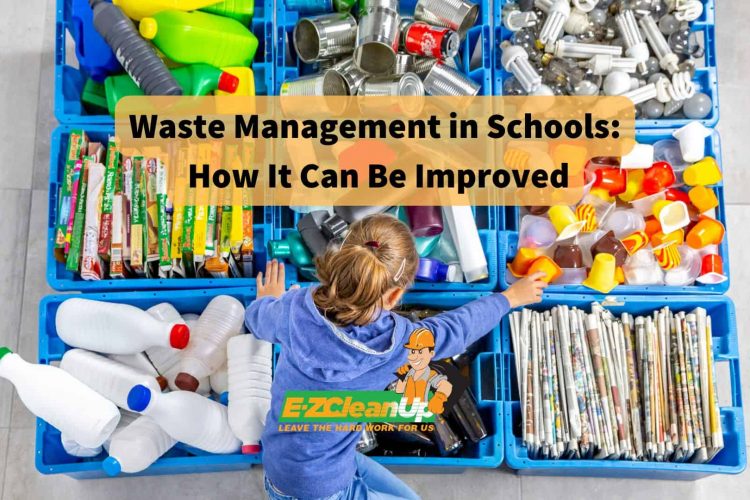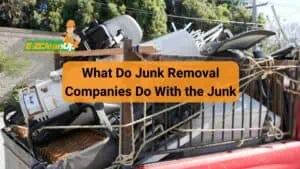Improving waste management in schools is necessary for building eco-friendly habits and responsibility among students. Simple strategies like sorting waste, recycling, composting, and raising awareness can make a big difference. These efforts help students become more aware of the environment and contribute to a greener future.
To discover more about how regularly improving waste management in schools can benefit both students and the environment–read on.

#1 Current Waste Management Practices in Schools
School waste management is essential for teaching students to care for the environment.
While many schools have waste programs, challenges can still exist. In the U.S., over 1,200 schools participate in DSNY composting programs. These schools receive training and support to manage food waste effectively. They also help students learn to reduce other waste and understand their impact on the planet.
However, waste sorting remains a challenge–as many students struggle with separating trash correctly–which can lead to more waste in landfills.
A study found that 63% of schools have recycling programs, but better recycling education is needed. For this reason, more schools need to actively promote waste management to inspire students–as these changes can have a positive impact on the community.
#2 Easy Ways to Enhance Waste Management in Schools
Improving waste management can be simple and effective. Here are some easy steps to take.
Better Waste Sorting
Setting up separate bins for paper, plastic, organic waste, and general trash helps students sort their waste correctly. Schools can also offer workshops or classes to teach proper recycling and composting.
Likewise, schools can partner with local recycling centers or a junk removal company to enhance waste management and guarantee proper collection and recycling of materials.
Start Recycling Programs
Schools can introduce recycling programs by teaching students about the 3 R’s: Reduce, Reuse, and Recycle. The participating schools can also collaborate with local businesses to support recycling efforts.
Composting Organic Waste
Composting food waste can help benefit schools by reducing landfill waste and reducing pollution. Besides, the compost can enrich school gardens, which can help aid in plant growth.
It can also educate students about recycling organic waste so they can learn more about environmental responsibility.
Reducing Single-Use Plastics in Schools

Single-use plastics are a big school waste issue. To tackle this, schools can promote reusable containers and water bottles, ban or limit plastics like bags and straws, and use eco-friendly alternatives.
These steps can help reduce plastic waste and support a much greener environment.
Promoting Awareness About Waste
Raising awareness by running campaigns can teach students how unmanaged waste harms the environment and health. They can also offer incentives, such as discounts or rewards, to boost participation.
Incorporating Waste Management into School Lessons
Teaching waste management through school subjects helps students learn waste audits to show real impact. This hands-on approach makes learning more engaging and helps students understand their role in protecting the environment.
Green Procurement Policy
A green procurement policy helps schools cut waste by focusing on products with minimal, recyclable packaging. The products are usually made from recycled or renewable materials and produced with renewable energy.

Clear guidelines can also help define eco-friendly standards, which can result in lowering the school’s environmental footprint.
Using Smart Waste Solutions
Smart waste solutions can also help improve school waste management. For instance, the use of solar panels saves energy and lowers electricity costs, which can promote sustainability.
These technologies make schools greener and teach students the importance of being eco-friendly.
Reward Sustainable Practices
A reward system can motivate students to adopt eco-friendly habits. Schools can offer incentives like stickers, goodies, or certificates for recycling and composting.

They can also hold events to celebrate students who actively participate and excel in waste management. Recognizing their efforts can encourage others to join in while promoting a culture of responsibility.
#3 How Junk Removal Services Can Support Schools
Junk removal services can play a key role in improving waste management in schools. They offer various solutions that make it easier for schools to handle waste effectively.

- Quick Removal of Bulky Items – They handle large items like old furniture and equipment.
- Proper Disposal and Recycling – They ensure items are disposed of correctly and can recycle materials like metal, wood, and electronics.
- Regular Waste Collections – Schools can schedule consistent pickups to prevent overflow and maintain a tidy environment.
- Support for Eco-Friendly Practices – Junk removal companies often assist with recycling programs and green initiatives.
- Emergency Cleanup – They provide fast cleanup after unexpected events or renovations to help schools stay safe and clean.
- Educational Workshops – Some services offer workshops on waste management and recycling to promote environmental education.
#4 FAQs
How can schools measure the success of their waste management programs?
Schools can track success by measuring the amount of waste diverted from landfills, the volume of recyclables collected, and overall waste reduction. Regular waste audits and monitoring student participation rates also provide handy indicators.
What types of items can junk removal services handle in schools?
Junk removal services can handle a wide range of items, including old furniture, outdated equipment, broken playground structures, and even large amounts of paper waste. They’re equipped to manage general waste and specialized items like electronics waste and hazardous materials.
How can schools encourage parent and community involvement in waste management?
Schools can involve parents and the community by hosting educational events, providing clear recycling guidelines, and offering volunteer opportunities for clean-up days. Recognizing their efforts in newsletters or social media can also help boost participation.
#5 The Bottom Line – Building a Sustainable Future

Effective waste management in schools is essential for promoting environmental responsibility. By implementing strategies like waste sorting, recycling programs, and composting, schools can significantly reduce waste and educate students about sustainability.
Pro-Papers can enhance these efforts by providing well-researched articles and educational materials that support schools in developing and promoting their waste management initiatives.
The ultimate goal is to create a cleaner, greener future for everyone. By taking action today, schools can lead by example and inspire the next generation to care for the environment.













